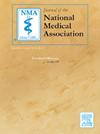在尼日利亚伊巴丹的一项社区研究中验证睡眠质量量表的因子结构和可靠性。
IF 2.5
4区 医学
Q1 MEDICINE, GENERAL & INTERNAL
引用次数: 0
摘要
背景:睡眠质量量表(SQS睡眠质量量表(SQS)是一种全面的多维睡眠评估量表,用于评估普通成年人的睡眠质量(SQ)。然而,该量表尚未在尼日利亚等非洲本土人群中进行验证。本研究在尼日利亚伊巴丹的社区成年人中验证了之前开发的 SQS 的因子结构并评估了其可靠性:从心血管疾病风险因素社区调查(COMBAT-CVDs)研究中提取了 3,635 名成人(≥18 岁)的 SQ 数据。Cronbach-alpha (α) 用于评估 SQS 的内部一致性或可靠性(>50% 临界值),同时使用探索性(≥0.5 临界值)和确认性因素分析探索 SQS 的原始 6 因子模型。在双侧 P < 0.05 的条件下,采用卡方拟合优度检验和多重拟合指数来评估模型的拟合程度:总体而言,参与者的平均年龄为(35.33±15.20)岁,54.60%为男性。SQS 的总体可靠性估计值为 86.00%,而睡眠后恢复子量表的可靠性为 93.00%。探索性和确认性因素分析表明,SQS 的原始 6 因子模型对这一社区成人样本来说更为合理:比较拟合指数大于 0.92,Tucker-Lewis 指数大于 0.91,近似均方根误差小于 0.05:我们的研究结果表明,SQS 有望用于基于人群的 SQ 评估,还有助于识别与睡眠相关的疾病,并监测非洲原住民的睡眠治疗效果。本文章由计算机程序翻译,如有差异,请以英文原文为准。
Validating the factor structure and reliability of the sleep quality scale in a community-based study in Ibadan, Nigeria
Background
The sleep quality scale (SQS) is a comprehensive multidimensional sleep assessment scale used to evaluate sleep quality (SQ) among adults in the general population. However, the scale is yet to be validated among indigenous African populations such as in Nigeria. This study validated the factor structure and evaluated the reliability of a previously developed SQS among community-based adults in Ibadan, Nigeria.
Methods
Data on SQ was extracted from 3,635 adult (≥18 years) from the Community-based Investigation of the Risk Factors for Cardiovascular Disease (COMBAT-CVDs) study. Cronbach-alpha () was used to evaluate the internal consistency or reliability of the SQS (>50 % cut-off), while the original 6-factor model of the SQS was explored using exploratory (≥0.5 cut-offs) and confirmatory factor analyses. The chi-square goodness of fit test and multiple fit indices were used to assess model fit at a two-sided P < 0.05.
Results
Overall, the participant's mean age was 35.33±15.20 years, and 54.60 % were male. The overall reliability estimate for the SQS was 86.00 %, while the restoration after sleep subscale reliability was 93.00 %. The exploratory and confirmatory factor analysis showed that the original 6-factor model of the SQS is a more plausible model for this sample of community-based adults: comparative fit index >0.92, Tucker-Lewis index > 0.91, root mean square error of approximation ≤ 0.05.
Conclusion
Our findings revealed that the SQS is promising for population-based assessment of SQ and may also assist in identifying sleep-related disorders and monitoring the efficacy of sleep treatment among indigenous Africans.
求助全文
通过发布文献求助,成功后即可免费获取论文全文。
去求助
来源期刊
CiteScore
4.80
自引率
3.00%
发文量
139
审稿时长
98 days
期刊介绍:
Journal of the National Medical Association, the official journal of the National Medical Association, is a peer-reviewed publication whose purpose is to address medical care disparities of persons of African descent.
The Journal of the National Medical Association is focused on specialized clinical research activities related to the health problems of African Americans and other minority groups. Special emphasis is placed on the application of medical science to improve the healthcare of underserved populations both in the United States and abroad. The Journal has the following objectives: (1) to expand the base of original peer-reviewed literature and the quality of that research on the topic of minority health; (2) to provide greater dissemination of this research; (3) to offer appropriate and timely recognition of the significant contributions of physicians who serve these populations; and (4) to promote engagement by member and non-member physicians in the overall goals and objectives of the National Medical Association.

 求助内容:
求助内容: 应助结果提醒方式:
应助结果提醒方式:


